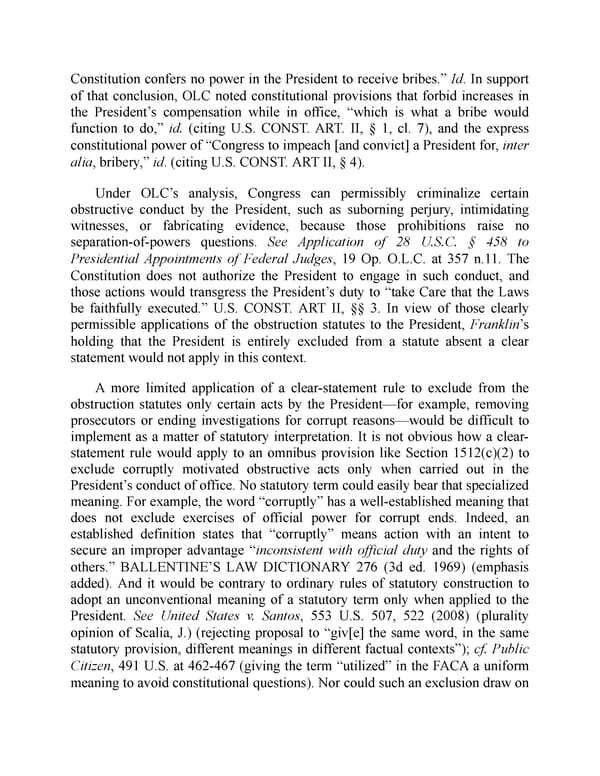Constitution confers no power in the President to receive bribes.” Id. In support of that conclusion, OLC noted constitutional provisions that forbid increases in the President’s compensation while in office, “which is what a bribe would function to do,” id. (citing U.S. CONST. ART. II, § 1, cl. 7), and the express constitutional power of “Congress to impeach [and convict] a President for, inter alia, bribery,” id. (citing U.S. CONST. ART II, § 4). Under OLC’s analysis, Congress can permissibly criminalize certain obstructive conduct by the President, such as suborning perjury, intimidating witnesses, or fabricating evidence, because those prohibitions raise no separation-of-powers questions. See Application of 28 U.S.C. § 458 to Presidential Appointments of Federal Judges, 19 Op. O.L.C. at 357 n.11. The Constitution does not authorize the President to engage in such conduct, and those actions would transgress the President’s duty to “take Care that the Laws be faithfully executed.” U.S. CONST. ART II, §§ 3. In view of those clearly permissible applications of the obstruction statutes to the President, Franklin’s holding that the President is entirely excluded from a statute absent a clear statement would not apply in this context. A more limited application of a clear-statement rule to exclude from the obstruction statutes only certain acts by the President—for example, removing prosecutors or ending investigations for corrupt reasons—would be difficult to implement as a matter of statutory interpretation. It is not obvious how a clear- statement rule would apply to an omnibus provision like Section 1512(c)(2) to exclude corruptly motivated obstructive acts only when carried out in the President’s conduct of office. No statutory term could easily bear that specialized meaning. For example, the word “corruptly” has a well-established meaning that does not exclude exercises of official power for corrupt ends. Indeed, an established definition states that “corruptly” means action with an intent to secure an improper advantage “inconsistent with official duty and the rights of others.” BALLENTINE’S LAW DICTIONARY 276 (3d ed. 1969) (emphasis added). And it would be contrary to ordinary rules of statutory construction to adopt an unconventional meaning of a statutory term only when applied to the President. See United States v. Santos, 553 U.S. 507, 522 (2008) (plurality opinion of Scalia, J.) (rejecting proposal to “giv[e] the same word, in the same statutory provision, different meanings in different factual contexts”); cf. Public Citizen, 491 U.S. at 462-467 (giving the term “utilized” in the FACA a uniform meaning to avoid constitutional questions). Nor could such an exclusion draw on
 Mueller Report PDF Page 500 Page 502
Mueller Report PDF Page 500 Page 502